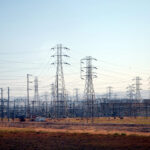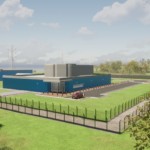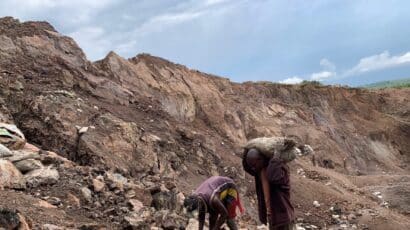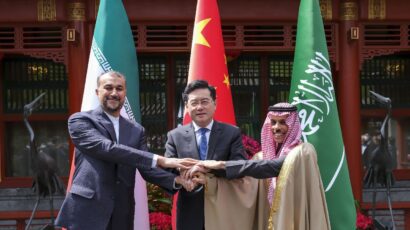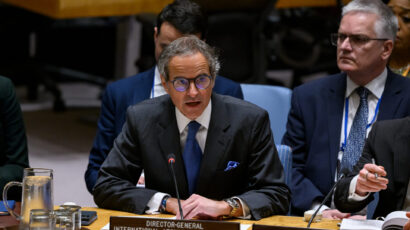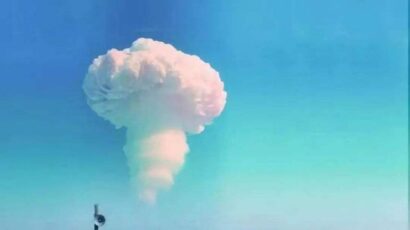With time running out before the expiration of the US-South Korea nuclear cooperation agreement that has governed the two countries’ nuclear trade since 1972, negotiators remain far apart on the terms of a new pact. Failure to reach a deal would threaten billions of dollars in nuclear commerce between the two countries.
With time running out before the expiration of the US-South Korea nuclear cooperation agreement that has governed the two countries' nuclear trade since 1972, negotiators remain far apart on the terms of a new pact. Failure to reach a deal would threaten billions of dollars in nuclear commerce between the two countries. It would also threaten Seoul's $20 billion contract to supply reactors to the United Arab Emirates (UAE), since those reactors contain parts and design information imported to South Korea from the United States under the current nuclear cooperation agreement. Surprisingly, however, the main sticking point in negotiations seems unlikely to be South Korea's desire to pursue a commercially untested form of reprocessing called pyroprocessing. Rather, the snag appears to be South Korea's interest in the other end of the fuel cycle — uranium enrichment.
South Korean officials are interested in developing an enrichment capacity for reasons both economic and political. The political concerns that surround enrichment in South Korea can be eased by diplomats working out appropriate language. The economic issues, meanwhile, can be addressed through measures like arranging South Korean investment in US enrichment facilities — which would provide Seoul much of what it wants from a domestic enrichment capacity without creating new proliferation risks.
Long in the tooth. The US and South Korean nuclear industries are quite interdependent. US-based Westinghouse built South Korea's first nuclear power plant, which began commercial operation in 1978, and American companies continue to be involved in many aspects of South Korea's nuclear industry. Companies such as Doosan, meanwhile, supply a variety of goods to nuclear plants in the United States and to American companies that build plants abroad. Westinghouse, now a subsidiary of the Japanese firm Toshiba, is part of the South Korean-led consortium that in 2009 captured a $20 billion contract to supply four reactors to the UAE.
The two countries' nuclear trade, however, takes place under a bilateral nuclear cooperation agreement that dates to the early 1970s; much has changed in the decades since. The Nuclear Non-Proliferation Act of 1978 applied stricter rules to US nuclear trade with non-nuclear weapon states. In 1992, North and South Korea signed the Joint Declaration on the Denuclearization of the Korean Peninsula, which prohibited both countries from possessing uranium enrichment or plutonium reprocessing facilities — a ban that North Korea has violated but that South Korea and the other members of the six-party talks with Pyongyang still consider in legal force. Spurred by Iran's controversial enrichment program, some on Capitol Hill currently favor legislation that would make it far more difficult for a country to establish a nuclear cooperation agreement with the United States if it engaged in sensitive fuel-cycle activities. Washington, therefore, wants to reach an agreement that both hews to its nonproliferation policies and does not roil South Korea's neighbors by complicating an eventual rollback of North Korea's enrichment and reprocessing programs. This means, from the US perspective, preserving South Korea's currently observed ban on domestic enrichment and reprocessing abilities.
To this point, negotiators have sought to keep disputes out of the spotlight in the hope of finalizing a treaty by June 2013 — an unofficial deadline, but one that probably must be met if the two countries' legislatures are to have sufficient time to ratify the agreement before it expires in March 2014. Negotiators' most concrete accomplishment so far has been a 2011 agreement to conduct a 10-year joint study on the technical and economic feasibility, and nonproliferation suitability, of pyroprocessing. That technology, still experimental, uses a "dry" electrochemical process to separate plutonium and other transuranic elements, collectively, from spent fuel. In this sense it differs from the traditional "wet" PUREX (plutonium uranium extraction) process, which uses liquid solvents and produces pure separated plutonium. South Korean officials have sought to portray the technology as less proliferation-prone than traditional reprocessing, but US officials and national laboratories do not see the risks as substantially different. Nonetheless, with negotiators having agreed to such a long-term exploration of pyroprocessing, disagreement over this issue probably will not come to a head until well past the time that a new agreement is concluded.
Settled, not settled. Just as negotiators seem to have pushed the pyroprocessing obstacle aside, South Korea has begun to voice a stronger interest in acquiring its own enrichment capability — something that US negotiators have so far resisted. Korean officials cite two reasons for acquiring enrichment technology. The first is to ensure sufficient fuel supplies for power plants. South Korea already operates 23 power reactors and aims nearly to double that number by 2030. Officials believe that as the number of nuclear power plants increases, a domestic enrichment facility would enjoy increasing economies of scale.
The second reason that South Korean officials want to develop an enrichment capacity is that they believe it would allow them to offer foreign buyers of nuclear reactors a more comprehensive package of services and greater security of fuel supply — in turn allowing South Korea to compete on a more even footing with France's Areva and Russia's Rosatom (the only firms that provide reactors as well as full fuel cycle services). South Korea will supply fuel to the UAE for the first 15 years that plants there operate, but must depend on Areva (among others) for help with milling, converting, and enriching uranium. Thus, Seoul has called for the agreement under negotiation to include blanket US consent for reprocessing or enriching fuel that comes from the United States or is irradiated in reactors with significant US content.
In South Korea, however, the dispute over enrichment has taken on a political dimension whose stakes in some ways dwarf the issue's economic and nonproliferation dimensions. South Korean politicians argue that US hesitation to grant advance consent for reprocessing and enrichment infringes on the country's nuclear sovereignty; officials complain that South Korea is being treated like a banana republic. They are particularly incensed that Japan, the other main US ally in Asia and also Korea's former occupier, long ago won US consent to reprocess or enrich US-origin fuel. This grousing, not surprisingly, has become more heated as presidential elections approach — November in the United States and December in South Korea. Any resolution to the issue before the elections in both countries seems unlikely.
Little value, little need. In any event, market economics suggests that South Korean officials may be overestimating the potential value of enrichment. At a time when Russia has a large amount of surplus enrichment capacity, and when the repercussions from the accident at the Fukushima Daiichi Nuclear Power Station have dampened expectations for enriched-fuel demand to the point that Areva has postponed construction of an enrichment facility in Idaho, little economic benefit would seem to be provided by building a facility in South Korea.
Moreover, South Korea has little reason to build an enrichment facility as a means of ensuring long-term fuel supply. The country has received fuel assurances for more than three decades — in the form of long-term contracts and consistent supplies. There is no reason to believe that suppliers from countries like Australia, Canada, France, and the Netherlands will suddenly become unreliable.
Similarly, little evidence suggests that South Korea could sell more nuclear plants overseas if it provided enrichment contracts. It is notable, for example, that Westinghouse — one of the largest firms involved in construction of power plants and provision of fuel — has chosen not to develop an enrichment capacity, precisely because it does not see this capacity as necessary to win contracts for plant sales.
Ways forward. Assuming the United States does not accede in the new nuclear cooperation agreement to South Korea's wish for blanket consent for reprocessing or enriching fuel originating from the United States, it is worth noting that current US law would not prevent a future US administration from striking a subsequent arrangement that granted South Korea reprocessing and enrichment rights (assuming that certain nonproliferation conditions were met). Still, to assuage South Korean concerns, the two countries should seek to fashion a process — akin to the 10-year pyroprocessing study — that would pass the issue of front-end fuel supply and related services to a joint group of experts, thus removing the issue from the political realm.
One possibility that the group might want to consider carefully would be to encourage South Korea's nuclear utility to take a substantial ownership stake in Areva's planned enrichment facility in Idaho, a Urenco facility operating in New Mexico, or a US Enrichment Corporation plant under development in Ohio. South Korean investment in the Ohio plant would offer particular benefits to the US government, given that the troubled US Enrichment Corporation has received large government bailouts, virtually renationalizing it. A deal could be structured along the lines of Russia's International Uranium Enrichment Center at Angarsk. There, Russia retains control of enrichment technology but Ukraine, Armenia, and Kazakhstan share in output. A model such as this would allow South Korea to enjoy the benefits of further assured fuel supply while allowing the United States to retain control of the enrichment technology.
Together, we make the world safer.
The Bulletin elevates expert voices above the noise. But as an independent nonprofit organization, our operations depend on the support of readers like you. Help us continue to deliver quality journalism that holds leaders accountable. Your support of our work at any level is important. In return, we promise our coverage will be understandable, influential, vigilant, solution-oriented, and fair-minded. Together we can make a difference.
Topics: Analysis, Nuclear Energy






